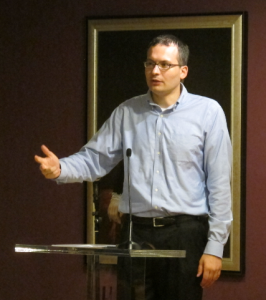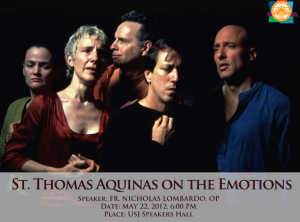A lecture on “St. Thomas Aquinas on Emotions†was held on May 22, 2012, at the Speakers Hall of the University of Saint Joseph (USJ), Macau. The lecturer was Fr. Nicholas Lombardo, OP. The academic program opened with the introduction of the topic and the presentation of the speaker by Fr. Fausto Gomez, OP, Professor at the USJ School of Christian Studies, University of Saint Joseph.
  The speaker, Fr. Lombardo, is a young Dominican of the American province of Saint Joseph. He is an assistant professor of Historical and Systematic Theology at the Catholic University of America. His main book is entitled The Logic of Desire: Aquinas on Emotions (Washington DC: CUA Press), which was awarded the prestigious John Templeton Award for Theological Promise. At present, Fr. Nicholas is traveling through South East Asia to proclaim the good news on emotions according to Saint Thomas Aquinas, including his lecture at the Catholic University of Macau.
  The speaker gave a comprehensive and scholarly view of Saint Thomas on emotions. As incarnate spirit, as “divine breath†(Gen 2:7) in a flesh, the human person is a being of emotions and passions and feelings. Saint Thomas treatise on the emotions, on “desire†found in his Commentary to the Sentences of Peter Lombard and in his Summa Theologiae is the longest and best structured up to Aquinas time. The teaching of Aquinas finds echo today in psychology, philosophy and theology. Thomas speaks not only of the passions or movements of the sense appetite but also of affections, which include also the movements of the intellectual appetite or the will – with its infinite desire for the good. Fr. Nicholas connected well passions and emotions with virtues to the point of saying that the more perfect the virtue the more it causes passion. Passions, he said, are not to be avoided, but to be ordered, channeled to become virtuous. Thus, passions and emotions can become not an obstacle but a resource for virtues. St. Thomas, always thought-provoking, tells us that our passions, are part of our human nature created by God and must be under the direction of right intellect and good will. I remember the words of St. Augustine, whom Thomas quotes often: “Passions are evil if love is evil, and good if it is good.”
The speaker gave a comprehensive and scholarly view of Saint Thomas on emotions. As incarnate spirit, as “divine breath†(Gen 2:7) in a flesh, the human person is a being of emotions and passions and feelings. Saint Thomas treatise on the emotions, on “desire†found in his Commentary to the Sentences of Peter Lombard and in his Summa Theologiae is the longest and best structured up to Aquinas time. The teaching of Aquinas finds echo today in psychology, philosophy and theology. Thomas speaks not only of the passions or movements of the sense appetite but also of affections, which include also the movements of the intellectual appetite or the will – with its infinite desire for the good. Fr. Nicholas connected well passions and emotions with virtues to the point of saying that the more perfect the virtue the more it causes passion. Passions, he said, are not to be avoided, but to be ordered, channeled to become virtuous. Thus, passions and emotions can become not an obstacle but a resource for virtues. St. Thomas, always thought-provoking, tells us that our passions, are part of our human nature created by God and must be under the direction of right intellect and good will. I remember the words of St. Augustine, whom Thomas quotes often: “Passions are evil if love is evil, and good if it is good.”
 After the lecture and open forum, Fr. Joao Eleuterio, Coordinator of the USJ School of Christian Studies closed the session with words of appreciation and gratitude. The lecture was attended by about 70 persons, including the Dominican brothers and sisters, and some professors of the University of Saint Joseph. It was indeed an excellent academic session. (FGB)
After the lecture and open forum, Fr. Joao Eleuterio, Coordinator of the USJ School of Christian Studies closed the session with words of appreciation and gratitude. The lecture was attended by about 70 persons, including the Dominican brothers and sisters, and some professors of the University of Saint Joseph. It was indeed an excellent academic session. (FGB)

